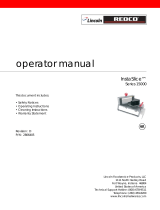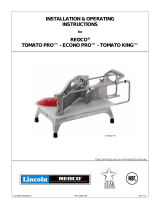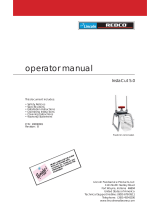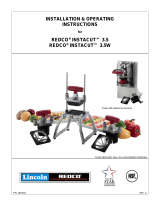Page is loading ...

Item No. 2350008-1 Rev 08/11
Operator’s Manual
Series 15100
15200
Thank you for purchasing this Vollrath Food Processing Equipment. Before operating the equipment, read and familiarize yourself with
the following operating and safety instructions. SAVE THESE INSTRUCTIONS FOR FUTURE REFERENCE. Save the original box and
packaging. Use this packaging to ship the equipment if repairs are needed.

Manual Food Processing equiPMent
OperatOr’s Manual
Safety PrecautionS
To ensure safe operation, read the following statements and
understand their meaning. This manual contains safety precautions
which are explained below. Please read carefully.
Warning is used to indicate the presence of a hazard that can cause
severe personal injury, death, or substantial property damage if the
warning is ignored.
Caution is used to indicate the presence of a hazard that will or can
cause minor personal injury or property damage if the caution is
ignored.
Note is used to notify people of installation, operation, or
maintenance information that is important but not hazard-related.
These precautions should be followed at all times. Failure to follow
these precautions could result in injury to yourself and others or
damage the equipment.
To reduce risk of injury or damage to the equipment:
To reduce risk of injury or damage to the equipment:
Check equipment before each use to insure the equipment is clean.
Check for broken, nicked or dull blades and if found, replace blade
assembly.
Check to insure that the pusher head sits down completely on the
rubber bumpers. The suction cups on each rear leg will hold the
equipment securely to smooth surfaces.
If necessary, lubricate guide rods using a light coating of mineral oil,
Petro Gel, or food grade lubricant. DO NOT USE COOKING OIL AS
IT WILL BECOME STICKY AND MAY PERMANENTLY DAMAGE THE
PUSHER HEAD BEARINGS
function and PurPoSe
Intended for slicing of tomatoes.
oPeration
Blades are sharp and can cause cuts and
amputation.
To avoid injury from sharp blades, handle with caution. Only trained
personal should operate equipment or preform maintenance.
Prior to rst use, it is important to clean the equipment. Wash new blades
with warm soapy water and rinse thoroughly to remove the thin protective oil
lm.
1. Place slicer on a table or counter. Position the InstaSlice Table Stop over
a table edge to hold the equipment in place
2. Before each use, always check for proper blade tightness and equipment
cleanliness. Check for broken, nicked or dull blades and if found, replace
blade assembly.
3. This equipment should be used to slice soft vegetables such as
tomatoes, mushrooms, strawberries, etc. Hard foods such as onions,
potatoes, lemons, etc. will cause blades to break. Use a Tomato King
Scooper to remove the stem scar of the tomato. For best results, the
tomatoes should be clean and wet before slicing them in the equipment.
4. Spray the plastic platform and blades with water to reduce friction and
repeat as needed during use.
5. Place the tomato top down on the platform of the slicer against the
pusher head. Place one hand on the pusher head handle and one hand
on the knob on top of the slicer. With a quick push of the pusher head,
push the tomato through the blades catching the slices into a pan placed
at the end of the slicer.
6. Repeat this process until you have prepared enough food for your daily
needs.
7. Rinse blades immediately. Failure to do so will shorten the life of the
blades.
cleaning
Blades are sharp and can cause cuts and
amputation.
To avoid injury from sharp blades, handle with caution. Only trained
personal should operate equipment or preform maintenance.
To maintain the appearance and increase the service life, clean your daily.
1. Place Pusher Head Assembly in its most “open” position by retracting the
handle.
2. Rinse or spray off equipment thoroughly with HOT water. You may want
to immerse the complete equipment in warm soapy water rst. Use
caution when handling the equipment - blades are sharp.
3. Do not wipe across blades or use scrub pads on this equipment. Wiping
across the sharp edge of the blade can cause injury and will dull the
blades.
4. Do not put this equipment in a dishwasher or dish machine with soaps,
detergents, or other alkaline chemicals that can harm the equipment.
5. After cleaning, let the equipment air dry.
6. Lubricate sliding parts with mineral oil or Petro Gel after each use.
Do not use cooking oil as it will become sticky and may permanently
damage the equipment.

Manual Food Processing equiPMent
OperatOr’s Manual
rePlacing Blade aSSemBly
Blades are sharp and can cause cuts and
amputation.
To avoid injury from sharp blades, handle with caution. Only trained
personal should operate equipment or preform maintenance.
Individual blades cannot be replaced. Replacement blades are available in
assemblies only.
The notches on the blade assembly t in groves on the bottom front of the
frame.
1. Loosen the two thumbscrews on the top of the equipment.
2. Push the top of the blade assembly from the back towards the front
and lift out. Replace in the opposite manner and tighten the two
thumbscrews.
3. Dispose of used blade assemblies properly.
Blade and PuSher head maintenance
1. Examine the pusher head ngers. If they are nicked or burred, smooth
the rough edges with a small at le. The spaces between the ngers
must be uniform. Straighten any bent ngers.
2. Check the clearance between the pusher head ngers and the blades.
Make sure they do not rest on or touch the blades at any point when you
move the head through its full travel. If there is contact, adjustments must
be made. Pusher head ngers must never contact blades.
3. Adjust pusher head nger spacing by placing a screwdriver between
pusher head ngers and gently rotate up/down. You may also adjust the
entire pusher head assembly by loosening the set screws underneath
and rotating the guide rod as needed - tighten set screws.
Preventative maintenance
4. Clean the equipment after every use.
5. Use for intended purposes only.
6. Change the blades regularly - based on usage.
trouBleShooting
If the equipment no longer slices tomatoes cleanly or without damage to the tomato, the blades could be dull and be in need of replacement. Broken, bent, or
nicked blades must be replaced immediately.
Broken Blade. Wrong food used in equipment. Slice only what is recommended.
Fingers are misaligned. Readjust ngers.
Blades are dull. Replace blade assembly as needed.

Manual Food Processing equiPMent
OperatOr’s Manual
A 369211 Thumb screw
B 0304 Knob
C 379064 Bridge casting
D
15112
Blade assembly, 7/32” (scalloped
blade)
15113 Blade assembly, 1/4” (scalloped blade)
15115
Blade assembly, 3/16” (scalloped
blade)
15114 Blade assembly, 3/8” (scalloped blade)
15206 Blade assembly, 7/32” (straight blade)
15207 Blade assembly, 1/4” (straight blade)
15209 Blade assembly, 3/16” (straight blade)
15208 Blade assembly, 3/8” (straight blade)
E 379069 Pusher head assembly bolt
F
379070 Pusher head assembly (complete) 7/32”
379071 Pusher head assembly (complete) 1/4”
379072
Pusher head assembly (complete) 3/16”
& 3/8”
G 379073 Shoulder bolt
H 379074 Handle assembly
I 379075 Guide rod (long)
J 379076 Table top
K 379049 RUBBER washer - guide rod
L 379077 Guide rod (short)
M 353 Nut - guide rod
N 2319 Rubber foot
O 379079 Base
Not
Shown
379065
Guard

SERVICE AND REPAIR
Serviceable parts are available on Vollrath.com.
To avoid serious injury or damage, never attempt to repair the unit or replace a damaged power cord yourself. Do not send units directly to
The Vollrath Company LLC. Please contact Vollrath Technical Services for instructions.
When contacting Vollrath Technical Services, please be ready with the item number, model number (if applicable), serial number, and proof of
purchase showing the date the unit was purchased.
WARRANTY STATEMENT FOR THE VOLLRATH CO. L.L.C.
This warranty does not apply to products purchased for personal, family or household use, and The Vollrath Company LLC does not offer a written
warranty to purchasers for such uses.
The Vollrath Company LLC warrants the products it manufactures or distributes against defects in materials and workmanship as specifically
described in our full warranty statement. In all cases, the warranty runs from the date of the end user’s original purchase date found on the receipt.
Any damages from improper use, abuse, modification or damage resulting from improper packaging during return shipment for warranty repair will
not be covered under warranty.
For complete warranty information, product registration and new product announcement, visit www.vollrath.com.

www.vollrathco.com
The Vollrath Company, L.L.C.
1236 North 18th Street
Sheboygan, WI 53081-3201
U.S.A.
Main Tel: 800.628.0830
Fax: 800.752.5620
Technical Services: 800.628.0832
Service Fax: 920.459.5462
Canada Service: 800.695.8560
© 2011 The Vollrath Company, L.L.C.
/





